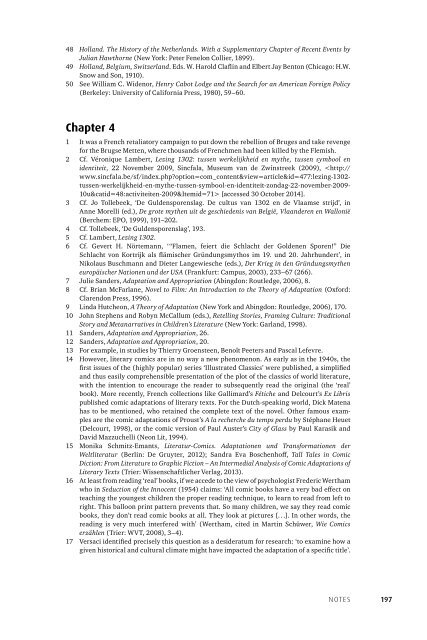Discord Consensus
7aze300jFJo
7aze300jFJo
You also want an ePaper? Increase the reach of your titles
YUMPU automatically turns print PDFs into web optimized ePapers that Google loves.
48 Holland. The History of the Netherlands. With a Supplementary Chapter of Recent Events by<br />
Julian Hawthorne (New York: Peter Fenelon Collier, 1899).<br />
49 Holland, Belgium, Switzerland. Eds. W. Harold Claflin and Elbert Jay Benton (Chicago: H.W.<br />
Snow and Son, 1910).<br />
50 See William C. Widenor, Henry Cabot Lodge and the Search for an American Foreign Policy<br />
(Berkeley: University of California Press, 1980), 59–60.<br />
Chapter 4<br />
1 It was a French retaliatory campaign to put down the rebellion of Bruges and take revenge<br />
for the Brugse Metten, where thousands of Frenchmen had been killed by the Flemish.<br />
2 Cf. Véronique Lambert, Lezing 1302: tussen werkelijkheid en mythe, tussen symbool en<br />
identiteit, 22 November 2009, Sincfala, Museum van de Zwinstreek (2009), [accessed 30 October 2014].<br />
3 Cf. Jo Tollebeek, ‘De Guldensporenslag. De cultus van 1302 en de Vlaamse strijd’, in<br />
Anne Morelli (ed.), De grote mythen uit de geschiedenis van België, Vlaanderen en Wallonië<br />
(Berchem: EPO, 1999), 191–202.<br />
4 Cf. Tollebeek, ‘De Guldensporenslag’, 193.<br />
5 Cf. Lambert, Lezing 1302.<br />
6 Cf. Gevert H. Nörtemann, ‘ “Flamen, feiert die Schlacht der Goldenen Sporen!” Die<br />
Schlacht von Kortrijk als flämischer Gründungsmythos im 19. und 20. Jahrhundert’, in<br />
Nikolaus Buschmann and Dieter Langewiesche (eds.), Der Krieg in den Gründungsmythen<br />
europäischer Nationen und der USA (Frankfurt: Campus, 2003), 233–67 (266).<br />
7 Julie Sanders, Adaptation and Appropriation (Abingdon: Routledge, 2006), 8.<br />
8 Cf. Brian McFarlane, Novel to Film: An Introduction to the Theory of Adaptation (Oxford:<br />
Clarendon Press, 1996).<br />
9 Linda Hutcheon, A Theory of Adaptation (New York and Abingdon: Routledge, 2006), 170.<br />
10 John Stephens and Robyn McCallum (eds.), Retelling Stories, Framing Culture: Traditional<br />
Story and Metanarratives in Children’s Literature (New York: Garland, 1998).<br />
11 Sanders, Adaptation and Appropriation, 26.<br />
12 Sanders, Adaptation and Appropriation, 20.<br />
13 For example, in studies by Thierry Groensteen, Benoît Peeters and Pascal Lefevre.<br />
14 However, literary comics are in no way a new phenomenon. As early as in the 1940s, the<br />
first issues of the (highly popular) series ‘Illustrated Classics’ were published, a simplified<br />
and thus easily comprehensible presentation of the plot of the classics of world literature,<br />
with the intention to encourage the reader to subsequently read the original (the ‘real’<br />
book). More recently, French collections like Gallimard’s Fétiche and Delcourt’s Ex Libris<br />
published comic adaptations of literary texts. For the Dutch-speaking world, Dick Matena<br />
has to be mentioned, who retained the complete text of the novel. Other famous examples<br />
are the comic adaptations of Proust’s A la recherche du temps perdu by Stéphane Heuet<br />
(Delcourt, 1998), or the comic version of Paul Auster’s City of Glass by Paul Karasik and<br />
David Mazzuchelli (Neon Lit, 1994).<br />
15 Monika Schmitz-Emants, Literatur-Comics. Adaptationen und Transformationen der<br />
Weltliteratur (Berlin: De Gruyter, 2012); Sandra Eva Boschenhoff, Tall Tales in Comic<br />
Diction: From Literature to Graphic Fiction – An Intermedial Analysis of Comic Adaptations of<br />
Literary Texts (Trier: Wissenschaftlicher Verlag, 2013).<br />
16 At least from reading ‘real’ books, if we accede to the view of psychologist Frederic Wertham<br />
who in Seduction of the Innocent (1954) claims: ‘All comic books have a very bad effect on<br />
teaching the youngest children the proper reading technique, to learn to read from left to<br />
right. This balloon print pattern prevents that. So many children, we say they read comic<br />
books, they don’t read comic books at all. They look at pictures [. . .]. In other words, the<br />
reading is very much interfered with’ (Wertham, cited in Martin Schüwer, Wie Comics<br />
erzählen (Trier: WVT, 2008), 3–4).<br />
17 Versaci identified precisely this question as a desideratum for research: ‘to examine how a<br />
given historical and cultural climate might have impacted the adaptation of a specific title’.<br />
NOTES<br />
197


